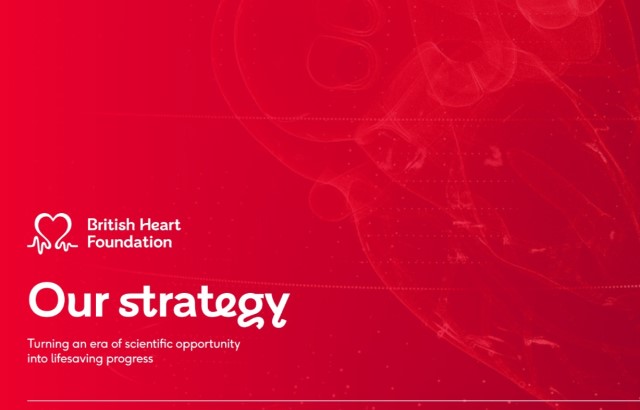
'Worst start to a decade for heart health for 50 years' warning as we launch new strategy



The UK’s heart health has declined more quickly at the start of the 2020s than in any other decade for over 50 years, we've warned today.

Jojo Clark with husband Matthew and their two children. Matthew died of a heart attack in 2023
New analysis shows there has been a rise in the rate and number of deaths in working-age adults aged 20-64 from cardiovascular disease in the UK.
The rate rose to 55 deaths per 100,000 in 2023 from 49 per 100,000 in 2019 – the first sustained increase in at least a generation. Deaths in working age adults rose by 18 per cent, from 18,693 in 2019, to 21,975 in 2023, averaging 420 a week.
This worrying trend follows decades of progress to nearly halve annual deaths from conditions like heart attack and stroke since the 1960s, which BHF-funded research, medical advances, and falling smoking rates helped to drive.
Bold approach needed
As we launch our new strategy today, we say a bold new approach to tackling cardiovascular disease is needed to reverse this trend.
Focusing investment on cutting-edge research in areas such as artificial intelligence (AI), data science and genomics could help to revolutionise how the UK prevents and treats cardiovascular disease. It adds that doing so could save countless lives and reduce significant pressure on the NHS.
We're urging governments, funders, and supporters to work together to make its vision a reality.
Our ambitious new strategy comes as other warning signs suggest a decline in the UK’s heart health since the start of the decade. Since 2020, latest UK figures show:
- A 21 per cent rise in the number of people diagnosed with heart failure, up to a record high of 785,000 from 650,000;
- A 10 per cent rise in the number of people diagnosed with atrial fibrillation, up to a record high of 1.62 million up from 1.48 million;
- A 12 per cent rise in the number of adults diagnosed with diabetes, a major risk factor for cardiovascular disease, up to a record high of 4.6 million from 4.1 million;
- Rising rates of obesity. An estimated 29 per cent of the adult population – 16 million adults – now have a weight defined as obese, up from 27 per cent;
- An 82 per cent increase in the NHS cardiovascular waiting list in England at 421,683 at the end of February 2025 up from 232,082 at the start of the decade. Cardiac waiting lists have also grown in Scotland, Wales, and Northern Ireland.
'We're driving a research revolution'
Dr Charmaine Griffiths, our Chief Executive, said: “It’s been the worst start to a decade for heart health for half a century, but we’re entering an era of immense scientific opportunity that can turn this tide.
“By driving a research revolution, we can reverse this worrying trend and save more lives than ever before. The BHF's new strategy will be key to this, and the next step for us as we aim to save many more families the heartbreak of losing loved ones far too soon.”
The reasons for the UK’s worsening heart health are complex and varied. However, we point to an increasingly unhealthy population, widening health inequalities, Covid-19, unprecedented pressure on the NHS, and a lack of meaningful action over the last decade to address many of the causes of heart disease and stroke, such as obesity.
In launching its new strategy today, the charity sets out three priorities that could help address these grave challenges. With the help of governments, partners and supporters, the charity pledges to:
Reimagine how the UK prevents heart diseases through embracing advances in areas like data science, artificial intelligence and behavioural sciences to detect and treat those at risk much earlier;
Significantly increase investment in UK cardiovascular research, including by translating more discoveries made in UK universities to treatments trialled and rolled out across the health service;
Ensure UK health systems radically improve the care and support people with heart conditions receive, including finding new and innovative ways to help people better manage their health and live well for longer.
We will also continue to campaign for governments across the UK to act in the best interests of the country’s heart health.
'We can't do this alone'
Professor Bryan Williams, our Chief Scientific and Medical Officer, said: “Research-driven innovation in the prevention and treatment of cardiovascular diseases has been one of the great success stories of modern medicine.
"However, these diseases remain one of the biggest yet most preventable causes of premature death and ill health. We need to act now to prevent the hard-won progress of recent decades being lost for future generations.
“Reimagining how we prevent and treat heart disease and stroke is key to transforming the nation’s health. Research and innovation are how we’ll achieve this, and the rapid advances in AI, data science, technology and advanced therapies offer us a glimpse into what’s possible if we capitalise on this era of scientific opportunity.
“We can’t do this alone, so support from governments and partners will be critical to unleash the potential of the UK’s life sciences sector to help unlock the lifesaving treatments and cures millions are still waiting for.”
By 2035, we want the UK to prevent 125,000 heart attacks and strokes, reduce early deaths from cardiovascular disease by 25 per cent, and reduce the number of years lost to heart-related ill health by 25 per cent by 2035.
We're the biggest independent funder of cardiovascular research in the UK, committing around £100m of new research awards every year.
We aim to grow funding over the next few years, as well as encouraging increased investment from others, given cardiovascular research remains chronically underfunded compared to the disease’s impact on people and society.
Jojo's story
Mum-of-two Joanna “Jojo” Clark from Guildford lost her “fit and healthy” husband Matthew to a heart attack aged just 46 in January 2023.
The day it happened, the whole family were recovering from a stomach bug, so Jojo thought little of it when draughtsman Matthew initially complained of stomach pains and indigestion. Neither thought it could be a problem with his heart.
Shortly afterwards, Matthew collapsed and went into cardiac arrest. His wife performed CPR for 11 minutes until the ambulance arrived and took Matthew to hospital. Tragically, he had a second cardiac arrest and could not be resuscitated.
Matthew’s post-mortem revealed he had asymptomatic coronary artery disease, which led to a heart attack and subsequent failure of the left bottom chamber of his heart.
Jojo, who was with Matthew for 15 years, said: “I always thought I knew the symptoms of a heart attack. You replay it in your mind hundreds of times, of what went wrong and when.
"However, the paramedics said Matthew’s chances of survival were almost zero as he had a full blockage in his coronary artery. The only way he would have survived is if I’d had a defibrillator in my hand the moment he collapsed.”

